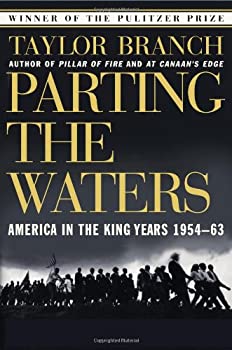FEBRUARY 16, 2021 – I have a dream that one day, every white person I’ve heard decry urban violence attributed to “Black Lives Matter” will read Taylor Branch’s Pulitzer Prize-winning Parting the Waters – America in the King Years 1954-63.
Yesterday I read the 63-page chapter, “The Montgomery Bus Boycott,” a detailed account of the social, legal, political, and economic maneuvering—and bombings by whites—that occurred in the months following Rosa Parks’ arrest. The boycott catapulted Martin Luther King, Jr. to international fame, but he was only one of many prominent figures among the dramatis personae. A player who injected, then directed the non-violence theme was a colorful eccentric, Bayard Rustin, of whom Branch says memorably, “It would have taxed the creative powers of Dickens or Hugo to invent him.”
Branch’s writing—I mean, the history he writes—leaves the reader breathless. The story should be assigned as much attention in history curricula as are the events so much more familiar to Americans. The details of the Montgomery bus boycott at once indict and inspire as they reveal our national complexity and expose our naiveté.
For me, there are three main take-aways.
FIRST, in our cruelty toward our Black citizens, we Americans have accrued debt too great to service. The only long-term solution is to file the moral equivalent of a petition for bankruptcy protection, followed by a full accounting of our insolvency (much of it attributable to “states rights”), and a plan of reorganization. The order for discharge can come only from a higher authority.
SECOND, within the baronial realm of Black Baptists in the first half of 20th century and into the 1950s was an enormous reservoir of extraordinarily well-educated, sophisticated, and influential leadership. Some of the richest inspiration and greatest power, however, came from the humblest people. The origins, development, and ultimately, the dilution, of vintage Black leadership and inspiration should pique the curiosity and inspire the inquiry of every American who seeks a greater understanding of who we are as a larger culture.
THIRD, where have I been? I ask this rhetorical question to confess that I’m emblematic of American ignorance; ignorance that blocks our progress and even threatens our survival. More specifically . . .
Long before my undergraduate days as a history major, I was interested in history. My dad got me started. He was fascinated by history. He subscribed to American Heritage, accumulated history books, read voraciously, and from my earliest school days, talked history. He knew much about the Civil War, its causes and its aftermath. But he never talked about Jim Crow or civil rights. Nor did I. Whether oblivious or dismissive, we weren’t interested. If neither my dad, to his dying day at nearly 88, nor I until very recently in my own approaching geezerhood, was much concerned with our national moral insolvency, what about the average white American?
Consequently, I have only a dream that one day, this nation will overcome . . . its ignorance.
Together, let’s make every month . . . “Overcome Ignorance Month.”
(Remember to subscribe to this blog and receive notifications of new posts by email.)
© 2021 by Eric Nilsson

2 Comments
Hi Eric,
I have been enjoying reading your blog for about the past month or so. My dad told me about it and I’m so glad he did! Today’s entry especially resonated with me. I couldn’t agree with you more. I just finished reading, “The Warmth of Other Suns”, the Pulitzer Prize-winning book by Isabel Wilkerson. I suspect you are familiar with it, but if you’re not, you should read it! It truly opened my eyes to my own incredible ignorance. She also has just written a book called, “Caste” which is excellent as well.
Thanks for your daily entries. I look forward to reading them each and every day!
Laura
Thank you, so much, Laura! Your comment means a lot, since you are a person with such very high standards. Yes, just last month I finished reading “The Warmth of Other Suns”–couldn’t put it down; and yes, though I haven’t yet read “Caste,” I’ve heard many people rave about that too. Personally, the past few years have radically altered my perspective on American history, society, culture, etc. On balance, NOT a pretty sight, despite many notable exceptions. Now more than ever, we who abhor the depths of the dark side need to sustain one another in the hope that enlightening influences can prevail. In any event, I hope this finds you and your family in good health and cheer
. Warm greetings to your parents. — Eric
Comments are closed.